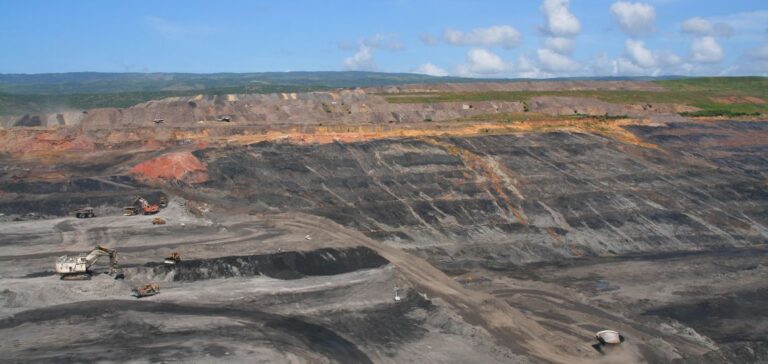Water or charcoal? Despite its economic weight, Colombian President Gustavo Petro is calling into question the largest open-cast coal deposit in Latin America, which would threaten local populations’ access to water.
Revisiting the Colombian Coal Field: Mr. Petro’s Position Papers
Critical of extractivism and its impact on the environment, Mr. Petro has made his position clear: in mid-August, during a visit by his counterpart from the Swiss Confederation Alain Berset, he announced that he wanted to obtain a “concerted departure” from the Swiss commodities giant Glencore. The latter holds the concession for the “El Cerrejon” mine in the Guajira department (in the far north of the country) until 2034.
With its six active pits and 80,000 tonnes of coal shipped daily by rail, “El Cerrejon” (named after a mountain sacred to the Wayuu indigenous people, the ancestral population of this wind-beaten, intensely hot region) covers 69,000 hectares of the Rancheria river basin.
State of Emergency Declared in Guajira : Call to Preserve Water Resources
Aerial images reveal the gigantic craters carved out by four decades of mining in this desert territory on the edge of the Caribbean Sea, stricken by poverty (67.4%) and a shortage of drinking water. Guajira is notorious for smuggling gasoline and trafficking with neighboring Venezuela, and serves as an exit point for Colombian cocaine.
At the beginning of July, President Petro declared a “state of economic, social and ecological emergency” in the department, in response to the “humanitarian and climatic crisis”, with access to water for local populations as a central theme. This announcement, mostly symbolic up to now, was aimed among other things at “conserving and maintaining the natural course of water sources” affected, according to Petro, by “an economic system that favors mining”. It prohibits “adding to or extending mining concession contracts”.
The President asserts that most of the region’s scarce water reserves are taken by the “agriculture, energy and coal” sectors. Most of the inhabitants depend on the “jagüeys”, huge pools of rainwater where animals also drink. In addition to thirst, the department also suffers from chronic malnutrition, which kills nearly a hundred children every year according to official figures.
The Economic Importance of the El Cerrejon Mine in Colombia
However, some experts emphasize the importance of one of the world’s largest mines for the Colombian economy, with its 12,000 direct and indirect jobs. Its coal accounts for 43% of La Guajira department’s GDP and 0.7% of national GDP, according to the Fedesarrollo research center. The “royalties” paid by the company “are essential to support vital sectors such as health, water, education and roads”, alarmed the department’s governor, Diala Wilches, on a local media channel.
“If coal extraction at the El Cerrejon mine is limited or abruptly halted, there will inevitably be a crisis in tax revenues (…) which will have to be offset by government transfers,” points out Sergio Cabrales, professor at the University of the Andes in Bogotá.
Energy Transition: A Crucial Alternative for the Future of Guajira
One solution to the dilemma could lie in the energy transition. Guajira, where wind speeds are twice the planetary average and radiation levels are 60% higher than global levels, is the cradle of several wind and solar power projects. But their implementation is progressing slowly, against a backdrop of territorial disputes and other quarrels with indigenous populations.
Governor Wilches is cautious: “We are looking to diversify our sources of income, but this must be done in a planned way to guarantee economic stability”, she pleads.
For Mr Cabrales, an expert in energy transition, the alternative is to “stimulate tourism, industry and the production of energy from renewable sources”. But this requires “time, national and international investment, and greater leadership”, he points out.
Asked by AFP about President Petro’s project, “El Cerrejon” officials pledged to “continue to operate in an environmentally responsible and community-oriented manner” until the end of the contract in 2034, highlighting its compliance with international standards (IFC) and its efforts to help local Wayuu communities. In documents shared by the company, it asserts that it does not use drinking water for coal extraction and, on the contrary, has several projects to protect aquifers.
Why does it matter?
This presidential decision in Colombia has major economic, environmental and social implications. It raises the fundamental question of access to water for local populations, while highlighting the challenges of economic dependence on mining.
On the one hand, the preservation of the environment and the health of local residents are at stake, with potentially disastrous consequences if mining continues. On the other hand, an abrupt halt to this activity could have an impact on the Colombian economy, considerably reducing tax revenues and jeopardizing vital sectors.
The transition to renewable energy sources offers a glimmer of hope, but requires investment and careful planning. The challenge for Colombia lies in striking a balance between environmental protection, economic security and the well-being of its local population.
The decision taken in this context will have long-lasting repercussions, and therefore deserves special attention on a national and international scale.






















